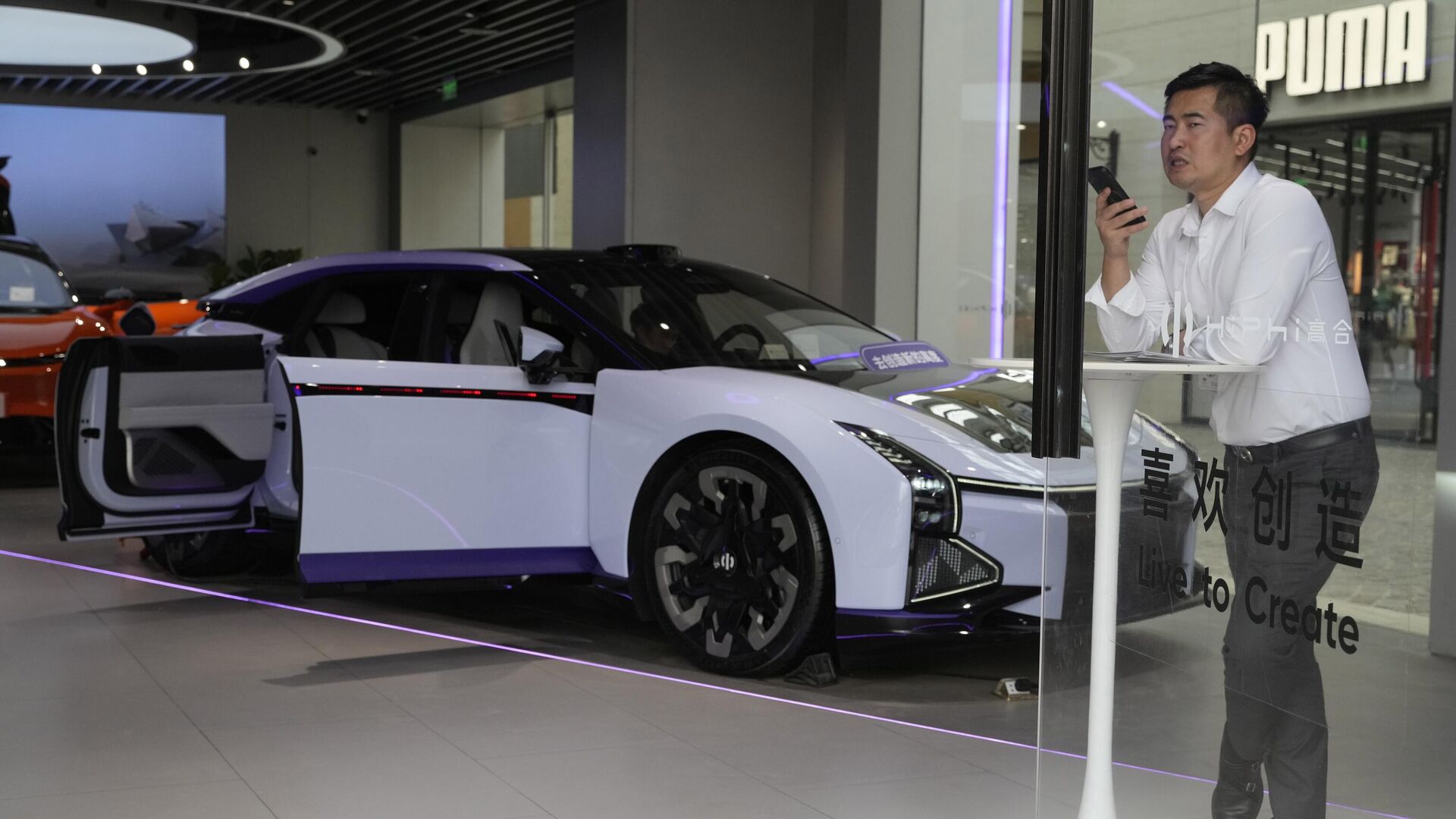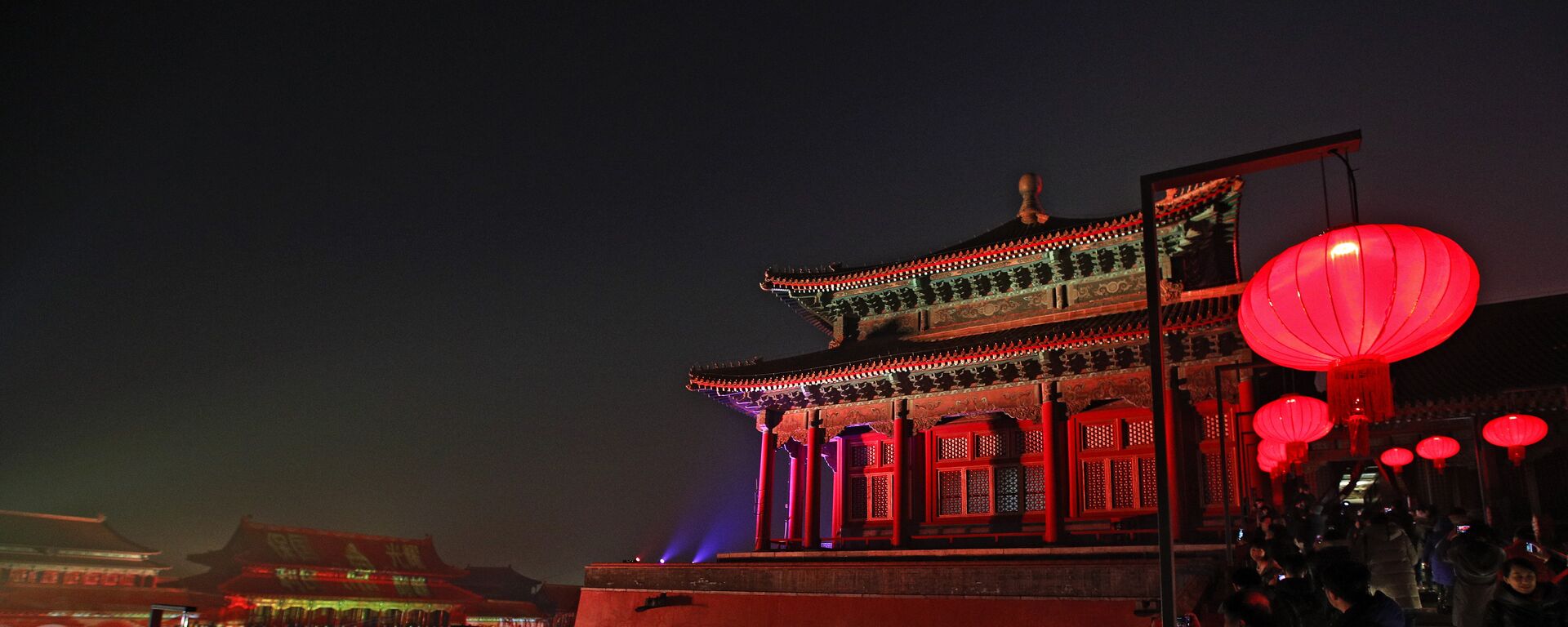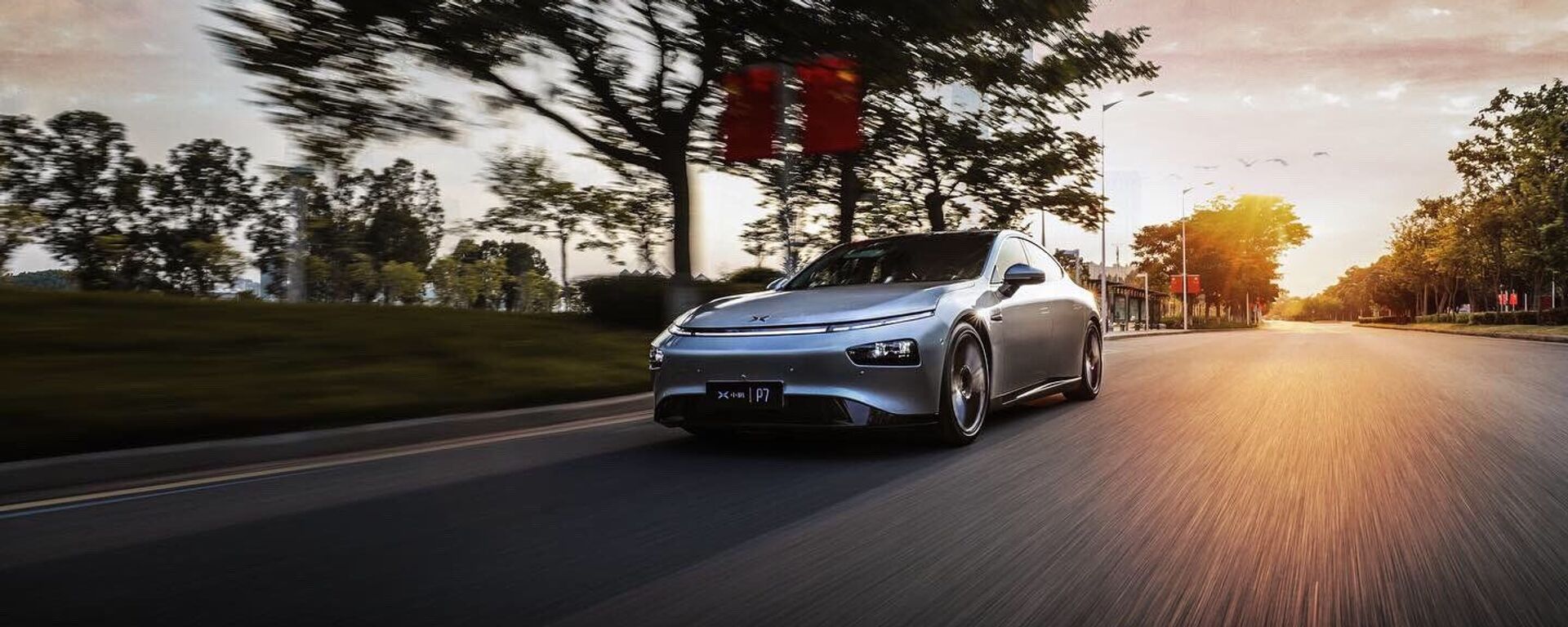https://sputnikglobe.com/20230723/increasingly-sophisticated-concerns-mount-against-chinese-autonomous-vehicle-firms-1112096190.html
'Increasingly Sophisticated': Concerns Mount Against Chinese Autonomous Vehicle Firms
'Increasingly Sophisticated': Concerns Mount Against Chinese Autonomous Vehicle Firms
Sputnik International
Concerns over autonomous automobiles manufactured by Chinese companies have sparked worries among some US lawmakers, who have called to limit their operations in the United States of America.
2023-07-23T19:47+0000
2023-07-23T19:47+0000
2025-04-07T11:07+0000
americas
tesla
communist party
us national highway traffic safety administration
beijing
california
china
pete buttigieg
us department of transportation
newsfeed
https://cdn1.img.sputnikglobe.com/img/07e7/06/0c/1111090706_0:49:3072:1777_1920x0_80_0_0_026ef758c988834f0a1db8e5a8c5b28e.jpg
US Transportation Secretary Pete Buttigieg pointed to potential national security risks concerning Chinese autonomous vehicle companies operating in the American market. As lawmakers proposed restrictions, the transport department is actively assessing the situation."Whether we are talking about hardware or software, in the same way, there are concerns around telecom or TikTok, there are concerns around transportation technologies," Buttigieg warned.“I remain concerned that a lack of US oversight in AV technology has opened the door for a foreign nation to spy on American soil, as Chinese companies potentially transfer critical data to the People’s Republic of China,” US Congressman August Pfluger said.In November of last year, Homeland Security Secretary Alejandro Mayorkas told a US House committee about the “perils of having communications infrastructure in the hands of nation-states that don't protect freedoms and rights as we do.”FBI Director Christopher Wray claimed that China has conducted data theft within the US by using “increasingly sophisticated, large-scale cyber espionage operations against a range of industries, organizations, and dissidents in the United States.”“I think there are platforms that I'll call out—TikTok, right off top—that are malevolent, that are both siphoning off huge amounts of data being used as a tool of state power," said Senator Chris Coons (D-DE). China has been at the forefront of autonomous vehicle tech pioneering, but the situation is gradually taking a new turn as US policymakers are alarmed about alleged intel gathering and covert monitoring. Consequently, Chinese companies currently testing their AVs in California, the world's largest autonomous vehicle testing ground, may face potential challenges.Self-driving vehicle companies of Chinese origin have gained a reputation in the US, as suggested in the February 17 publication of the California Department of Motor Vehicles' annual report on AV testing in the state.According to the report, test cars completed a record 5.7 million miles in autonomous mode and 5.1 million miles with a safety driver and 622,257 miles with driverless testing. Eight Chinese AV makers collectively reached 450,000 miles during drive tests between December 2021 and November 2022, which falls short of over 510,000 recorded in 2021.Problems With Chinese AV in the United StatesIn 2017, concerns about AVs being converted into "weapons" due to the rapid advancement of self-driving technology without adequate regulations, led governments worldwide to struggle with determining the appropriate conditions and timing for permitting such vehicles on their roads.Security concerns propelled US congressman Pfluger to convey his discontent through a letter on November 18, 2022, to the US National Highway Traffic Safety Administration.On July 17, a cross-party coalition of four lawmakers conveyed a written request to Secretary of Transportation and Secretary of Commerce Gina Raimondo, urging them to investigate the prevalence of Chinese AV technology on US soil. The letter aims to explore ways to restrict its impact within the country.Why California Matters for TestingMany Chinese companies are coming to Silicon Valley, and out of the 60 companies which have permits to test autonomous vehicles in California, 14 are from China.China's goal to dominate the AV industry is dependent primarily on research and development clusters in Silicon Valley. Such clusters make it easy for Chinese companies to hire hundreds of software engineers and collaborate with vital suppliers of US technology. Moreover, California offers prestige in proving their technology and investment attraction, which is the fulcrum for AV research.What lies ahead for Chinese AV firms in the US?US lawmakers fear that China may exploit autonomous vehicles and similar technology as a way to penetrate American infrastructure, especially when considering the previous ban on Huawei's involvement in 5G tech. This concern may make the "next-generation" vehicles a possible point of conflict between the US and China. "Without producing any credible evidence, the US government uses national security as a catch-all pretext and all its apparatus to wantonly suppress and sanction Huawei, restricting its products’ entry into the US market, cutting off its access to chips and operating system, and coercing countries around the world into banning Huawei from their 5G rollout. In violation of the principle of fair competition and market economy and international trading rules, the US seeks to hamstring competitive Chinese hi-tech companies under all kinds of trumped-up charges," according to Ministry of Foreign Affairs, the People's Republic of China.China, in turn, has placed stringent restrictions on Tesla's driving locations, especially around military facilities, during high-level Communist Party gatherings, citing security concerns implemented in the past year.
https://sputnikglobe.com/20230324/china-says-us-showed-no-proof-of-tiktok-being-national-security-threat-1108753507.html
https://sputnikglobe.com/20210415/chinese-automaker-xpeng-motors-set-to-develp-chips-for-autonomous-vehicles-amid-global-chip-1082638859.html
americas
beijing
california
china
Sputnik International
feedback@sputniknews.com
+74956456601
MIA „Rossiya Segodnya“
2023
Chimauchem Nwosu
https://cdn1.img.sputnikglobe.com/img/07e7/09/01/1113046371_0:99:1536:1635_100x100_80_0_0_9c5c627283eca931c39fe4852bbb301c.jpg
Chimauchem Nwosu
https://cdn1.img.sputnikglobe.com/img/07e7/09/01/1113046371_0:99:1536:1635_100x100_80_0_0_9c5c627283eca931c39fe4852bbb301c.jpg
News
en_EN
Sputnik International
feedback@sputniknews.com
+74956456601
MIA „Rossiya Segodnya“
Sputnik International
feedback@sputniknews.com
+74956456601
MIA „Rossiya Segodnya“
Chimauchem Nwosu
https://cdn1.img.sputnikglobe.com/img/07e7/09/01/1113046371_0:99:1536:1635_100x100_80_0_0_9c5c627283eca931c39fe4852bbb301c.jpg
chinese av, us lawmakers, national security, autonomous vehicles, intel gathering, covert monitoring, california testing, transportation, chinese companies, us-china conflict, driverless cars, autonomous automobiles
chinese av, us lawmakers, national security, autonomous vehicles, intel gathering, covert monitoring, california testing, transportation, chinese companies, us-china conflict, driverless cars, autonomous automobiles
'Increasingly Sophisticated': Concerns Mount Against Chinese Autonomous Vehicle Firms
19:47 GMT 23.07.2023 (Updated: 11:07 GMT 07.04.2025) Concerns over autonomous automobiles manufactured by Chinese companies have sparked concern among some US lawmakers, who are now calling for operations to be limited in the US market.
US Transportation Secretary Pete Buttigieg pointed to potential national security risks concerning Chinese autonomous vehicle companies operating in the American market. As lawmakers proposed restrictions, the transport department is actively assessing the situation.
"Whether we are talking about hardware or software, in the same way, there are concerns around telecom or TikTok, there are concerns around transportation technologies," Buttigieg warned.
“I remain concerned that a lack of US oversight in AV technology has opened the door for a foreign nation to spy on American soil, as Chinese companies potentially transfer critical data to the People’s Republic of China,” US Congressman August Pfluger said.
In November of last year, Homeland Security Secretary Alejandro Mayorkas told a US House committee about the “perils of having communications infrastructure in the hands of nation-states that don't protect freedoms and rights as we do.”
FBI Director Christopher Wray claimed that China has conducted data theft within the US by using “increasingly sophisticated, large-scale cyber espionage operations against a range of industries, organizations, and dissidents in the United States.”
“I think there are platforms that I'll call out—TikTok, right off top—that are malevolent, that are both siphoning off huge amounts of data being used as a tool of state power," said Senator Chris Coons (D-DE).
China has been at the forefront of autonomous vehicle tech pioneering, but the situation is gradually taking a new turn as US policymakers are alarmed about alleged intel gathering and covert monitoring.
Consequently, Chinese companies currently testing their AVs in California, the world's largest autonomous vehicle testing ground, may face potential challenges.
Self-driving vehicle companies of Chinese origin have gained a reputation in the US, as suggested in the February 17
publication of the California Department of Motor Vehicles' annual report on AV testing in the state.
According to the report, test cars completed a record 5.7 million miles in autonomous mode and 5.1 million miles with a safety driver and 622,257 miles with driverless testing. Eight
Chinese AV makers collectively reached 450,000 miles during drive tests between December 2021 and November 2022, which falls short of over 510,000 recorded in 2021.
Problems With Chinese AV in the United States
In 2017, concerns about AVs being converted into "weapons" due to the rapid advancement of self-driving technology without adequate regulations, led governments worldwide to struggle with determining the appropriate conditions and timing for permitting such vehicles on their roads.
Security concerns propelled US congressman Pfluger to convey his discontent through a
letter on November 18, 2022, to the US National Highway Traffic Safety Administration.
On July 17, a cross-party coalition of four lawmakers conveyed a written request to Secretary of Transportation and Secretary of Commerce Gina Raimondo, urging them to investigate the prevalence of Chinese AV technology on US soil. The letter aims to explore ways to restrict its impact within the country.
Why California Matters for Testing
Many Chinese companies are coming to Silicon Valley, and out of the
60 companies which have permits to test autonomous vehicles in California, 14 are from China.
China's goal to dominate the AV industry is dependent primarily on research and development clusters in Silicon Valley. Such clusters make it easy for Chinese companies to hire hundreds of software engineers and collaborate with vital suppliers of US technology. Moreover, California offers prestige in proving their technology and investment attraction, which is the fulcrum for AV research.
What lies ahead for Chinese AV firms in the US?
US lawmakers fear that China may exploit autonomous vehicles and similar technology as a way to penetrate American infrastructure, especially when considering the previous ban on Huawei's involvement in 5G tech. This concern may make the "next-generation" vehicles a possible point of conflict between the US and China.
"Without producing any credible evidence, the US government uses national security as a catch-all pretext and all its apparatus to wantonly suppress and sanction Huawei, restricting its products’ entry into the US market, cutting off its access to chips and operating system, and coercing countries around the world into banning Huawei from their 5G rollout. In violation of the principle of fair competition and market economy and international trading rules, the US seeks to hamstring competitive Chinese hi-tech companies under all kinds of trumped-up charges," according to Ministry of Foreign Affairs, the People's Republic of China.
China, in turn, has placed
stringent restrictions on Tesla's driving locations, especially around military facilities, during high-level Communist Party gatherings, citing security concerns implemented in the past year.





